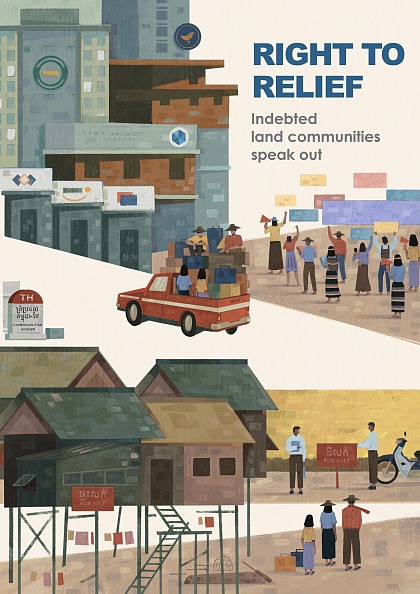IFC Watchdog Accepts Complaint over Microfinance Abuses in Cambodia
Published on 3 May 2022; Joint OrganizationsThe Compliance Advisor Ombudsman of the International Finance Corporation (IFC) has accepted and will move ahead with its review of a complaint alleging human rights violations and violations of IFC performance standards committed by six microfinance institutions and banks that offer microloans in Cambodia.
The complaint was filed on behalf of affected borrowers by Equitable Cambodia (EC) and the Cambodian League for the Promotion and Defense of Human Rights (LICADHO). It details how the IFC failed in its obligation to conduct due diligence and supervise projects to ensure compliance with performance standards. As a result, grave harms resulted from IFC loans and investments in six microfinance institutions (MFIs) and microloan-providing banks in Cambodia – ACLEDA, Hattha Bank, Sathapana, Amret, LOLC, and Prasac – who together hold about 75% of the country’s microloans.
These six institutions combined have received approval for more than $400 million in IFC funding over the last five years, including direct loans, syndicated loans, equity investments and loans from IFC-backed funds. The complainants are calling for the IFC’s Compliance Advisor Ombudsman (CAO) to launch a swift, independent investigation into the harms caused by these investments. The CAO will now move forward in its review, and complainants can choose between dispute resolution or a compliance appraisal and investigation to determine the full size and scope of the violations of IFC policies and performance standards.
The IFC’s reckless investments and lack of due diligence regarding its microfinance projects have destroyed lives and wrecked communities across Cambodia, and they must take steps to offer real relief to these borrowers
“These complainants are taking a risk to share their experiences in order to expose the harms and abuses perpetrated by MFIs and banks in Cambodia,” said Pilorge Naly, outreach director of LICADHO. “The IFC’s reckless investments and lack of due diligence regarding its microfinance projects have destroyed lives and wrecked communities across Cambodia, and they must take steps to offer real relief to these borrowers.”
To our knowledge, this is the first ever complaint alleging violations of IFC Performance Standards as a direct result of investments in MFIs and microloan providers accepted by the CAO. The complaint demonstrates that IFC microloan projects directly violated the IFC’s “Exclusion List” of prohibited investments involving child labour and violations of the land rights of Indigenous Peoples without informed consent, as well as infringing on the following IFC performance standards:
▪ Performance Standard 1: Assessment and Management of Environmental and Social Risks and Impacts
▪ Performance Standard 2: Labour and Working Conditions
▪ Performance Standard 4: Community Health, Safety and Security
▪ Performance Standard 5: Land Acquisition and Involuntary Resettlement
▪ Performance Standard 7: Indigenous Peoples
They must take immediate steps to independently investigate these abuses, provide appropriate remedies to victims harmed by their reckless investments, dramatically strengthen consumer protection, and set up effective monitoring systems to avoid future harms caused by investments
There are nearly 3 million microloans totaling more than $14 billion currently held by Cambodian households, and a sector-wide audit of the country’s microloan sector is urgently needed to identify the scope and severity of harms associated with these loans across the country.
“The serious human rights violations caused by the sector have been ongoing for years and we hope the detailed information provided in the complaint will serve as a wake-up call to the IFC,” said Eang Vuthy, executive director of EC. “They must take immediate steps to independently investigate these abuses, provide appropriate remedies to victims harmed by their reckless investments, dramatically strengthen consumer protection, and set up effective monitoring systems to avoid future harms caused by investments.”
For more information, please contact:
▪ Eang Vuthy, Executive Director of Equitable Cambodia, on Signal at (+855) 12 791 700 (English and Khmer)
▪ Am Sam Ath, Operations Director of LICADHO, on Signal at (+855) 10 327 770 (Khmer)
▪ Pilorge Naly, Outreach Director of LICADHO, on Signal at (+855) 12 214 454 (English)
Background
In June 2021, LICADHO and EC co-published a joint report, Right to Relief: Indebted Land Communities Speak Out, highlighting human rights abuses linked to microloan debt in 14 communities across nine provinces in Cambodia. The report involved interviews with hundreds of community members across the country and documented widespread and systematic abuses by IFC-funded micro-lenders. The report documented numerous abuses linked to microloan debt including aggressive lending practices, coerced land sales, threats, child labour, and increased debt burdens for borrowers.
Since 2019, LICADHO has published three other reports, along with other Cambodia civil society organisations, highlighting Cambodia’s over-indebtedness crisis. In June 2020, Worked to Debt: Over-Indebtedness in Cambodia’s Garment Sector was published alongside Cambodian labour rights NGO CENTRAL; in May 2020, LICADHO published Driven Out: One Village’s Experience with MFIs and Cross-Border Migration; and in August 2019, LICADHO and urban rights NGO Sahmakum Teang Tnaut (STT) published Collateral Damage: Land Loss and Abuses in Cambodia’s Microfinance Sector.
Cambodians currently hold the largest microloans in the world. Average loan sizes exceed the incomes of 95% of Cambodians, and microloans are frequently collateralized with borrowers’ land titles. Despite the extensive documentation of human rights abuses linked to these loans, Cambodian MFIs and microloan providers continues to receive hundreds of millions of dollars in funding from multilateral organisations such as the IFC and ADB; European state development organizations such as KfW, FMO, Proparco, Finnfund, Norfund, OeEB, and SIDA; and private investors from across Europe and the United States.
PDF: Download full statement in English - Download full statement in Khmer
MP3: Listen to audio version in Khmer
- Topics
- Microfinance/Debt








